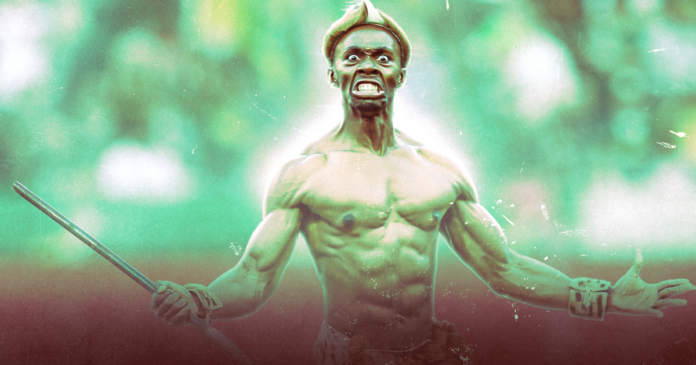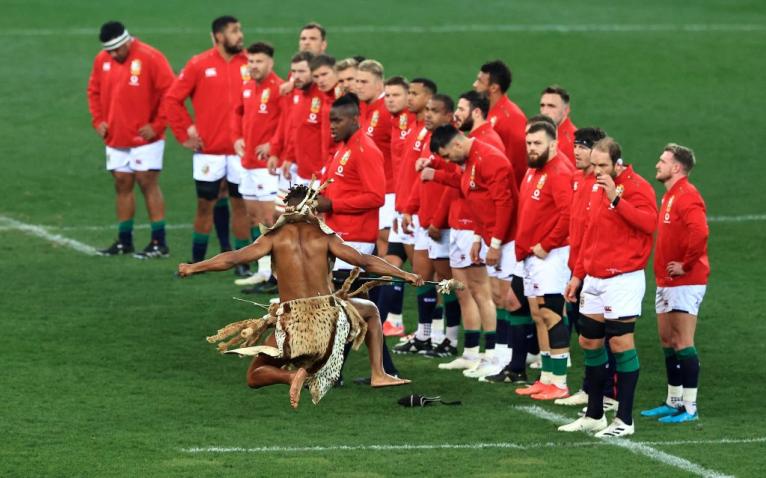
[ad_1]
In the foreground is Siya Kolisi, whose status as a demigod in South Africa has long been established. The New Zealand All Blacks stand in a row in the background, representing the arch villains in the fable. Between them, amplifying the folkloric feel, are two behemoths wearing leopard skins and holding spears.
Such an honor running the @Springboks out.
This pic is really iconic 🔥 https://t.co/qwLqL2YQ2U
— Sibusiso Kotelo (@sibusisokotelo) September 10, 2024
“What we do is spiritual,” says Sibusiso Kotela, whose presence in the photo transforms what would be an ordinary shot of the Springboks’ entry onto the pitch into something from another realm.
Out thrusts his iklwa, the short stabbing spear made famous by the great conqueror Shaka Zulu. The arm holding it seems to be carved from the hardest stones of the uKhahlamba mountains. His torso is double the size of any player’s and his face is filled with menace as he roars in unison with Kolisi, both of them charging into rugby’s greatest challenge.
“It’s an incredible honour leading the team out at home matches,” says Kotela, the leading Impi warrior and now one of the most famous mascots in world sport. “I see myself as the intro to a story. It’s my job to set the tone.”
The idea to wear a costume like a pro wrestler was put on the table but I shot it down. If I was going to do this I wanted to do it right.
The tale of the Springboks Impi begins in 2012 but was largely seen as a gimmick at first. “He wasn’t the biggest guy and [the spectacle] didn’t carry weight or impetus,” explains Marlon Kruger, the marketing and communications manager for SA Rugby.
That changed five years later when Kruger made a simple but ingenious tweak. Rather than recruit an actor, he’d scout for bodybuilders who already had the right combination of heft and showmanship. On 10 June 2017, against France at Loftus Versfeld in Pretoria, a legend was born.
“When I went in I had no clue what to do, I had no script, I had to work from nothing,” recalls Joshua Nkosi, the first of the modern Impis who led the team out in 27 matches, putting him level with Chester Williams and Hennie le Roux in Springbok appearances. “Before I came the concept was misunderstood.”
Nkosi now runs a successful dentist practice, but back then he was also an athlete in his own right having placed first in the 2014 NABBA-WFF Universe Championships in South Korea. When he was approached by SA Rugby, he felt confident in his abilities to put on a show but was adamant to give the role the respect it deserved.
The Zulu impi warriors have become an integral part of the pre-match build-up to a Springbok Test (Photo by PHILL MAGAKOE/AFP via Getty Images)
“The idea to wear a costume like a pro wrestler was put on the table but I shot it down,” Nkosi says. “If I was going to do this I wanted to do it right. I wanted it to be authentic to the Nguni culture which represents all the Southern African tribes. I was there to entertain but I also saw my role as a cultural advisor. I hope that all the guys who have come after me feel the same way.”
Nkosi’s busy professional life away from rugby meant he had to hang up his spear at the end of 2022. By then the Springboks themselves had transformed. “I see myself as a midwife of sorts,” Nkosi adds. “Now the Impi isn’t just a mascot, it represents the country and the team. We have a black captain, many black players, the crowd at the stadium looks different than it did when I started. We’ve showcased this sport is for all South Africans.”
That is not to say there haven’t been critics. “One of the first things people said to me was that I was holding the spear incorrectly,” says Daniel Matloga, a bodybuilder who took over the reins from Nkosi at the start of 2023. “Even the way I ran, people said that it was wrong. There is always going to be someone who has a problem with what you do. Bodybuilding taught me that the people who make the most noise aren’t doing so to help. They just want to criticise.”
There have also been concerns that the show fetishises African culture. Burly men parading in animal skins shaking spears and dancing with unhinged fervour; is this sending a distorted image to the world?
I don’t like the word cultural appropriation. The Zulu culture has got such a strong history with the Springboks.
“We were absolutely conscious of that,” Kruger admits. “This is South Africa. You’re never going to please everyone. If you put something out in the public you’re not going to get 100% buy-in. I’ve personally not encountered any criticism. I don’t like the word cultural appropriation. The Zulu culture has got such a strong history with the Springboks.”
Indeed it does. In 1921, during South Africa’s first ever tour of New Zealand, in the series-deciding Test in Wellington, the All Blacks performed a pre-match haka for the first time on home soil. In response, the all-white Springboks reciprocated with an Indlamu, a traditional Zulu dance performed by soldiers before battle. The Boks would again respond to New Zealand’s haka with an Indlamu in 1928 with future captain, World War II veteran and Zulu-speaker Philip Nel leading the ritual.
According to historian Michael Charton, Nel was born and raised on a farm bordering Zulu country and so “grew up fluent in Zulu. Having been born just 23 years after the famous battle of Isandlwana, Philip probably would have heard first-hand accounts of this famous battle from ageing but very proud Zulu warriors. Because Isandlwana saw the Zulu people register an incredible victory. A victory whereby Shaka’s old pincer movement had outsmarted the mighty British army, the most powerful and modern military force on planet Earth.”
Kruger picks up the story: “The Zulu culture represents more people in South Africa than any other group. And the Zulus are famous for warfare. They overcame the British who had a great technological advantage but the Zulus overcame them with nothing but spears and shields and willpower. They had far less resources but they still beat a much wealthier nation. That is what the Impis represent – the African spirit that allows them to overcome any obstacle no matter the odds. That is what we’re trying to get across.”
 The 2021 British and Irish Lions encountered the impis during their Test series (Photo by David Rogers/Getty Images)
The 2021 British and Irish Lions encountered the impis during their Test series (Photo by David Rogers/Getty Images)
Which is why any criticism from the outside is easily dismissed by those who assume the role of the Impi. “There are always doubters,” adds Kotela, who has shrugged off his own naysayers to become the first black South African to win a pro card from the International Federation of Bodybuilding and Fitness. “But you can’t have doubts to yourself. I’m there to be on the front foot. I’m there to intimidate. My job is to say to the opposition, ‘I’m here and I’m ready to fight’. I want them to say, ‘I didn’t know they made them that big down here’. I want them to be terrified before the opening whistle.”
The Impis have on occasion been told to tone it down and keep their distance from visiting players. Once an All Black screamed back at Matloga, telling him to ‘f**k off!”. Just recently, in the game against New Zealand in Johannesburg – Kotela’s first match as the lead Impi – one of the three warriors dangled a spear a little too close to a Kiwi nose.
“They weren’t happy,” Kotela says with a mischievous laugh. “But mostly they’re pretty chill. I got right upfront to Beauden Barrett and he couldn’t hold my eye contact. He looked away and shook his head. I like to think that he felt my intent.
I look intimidating because of my size but I also have to embody that warrior spirit. Which is why I love that photo of me and Siya so much.
“I believe that we make a difference. The Springboks are national key points for South Africa and being in their presence requires me to match their confidence. I look intimidating because of my size but I also have to embody that warrior spirit. Which is why I love that photo of me and Siya so much.
“Normally, when I’m in a bodybuilding show, any great picture of me is planned. I’m on stage deliberately flexing a particular muscle. But this was organic. It almost felt like I was channelling what South Africa has wanted to tell Siya, that we have his back in an authentically South African way. And if he ever has any doubt, he can look behind him and see a warrior with 60 million other people behind him. I hope that’s the message that people get from that picture.”
When the Springboks take aim at the Rugby Championship title against Argentina in Mbombela this weekend, they will do so with Kotela at the helm. And with every roar and thrust of his spear he will underline the transformative narrative in South African rugby as a testament to the power of representation.
[ad_2]
Copyright for syndicated content belongs to the linked Source link

